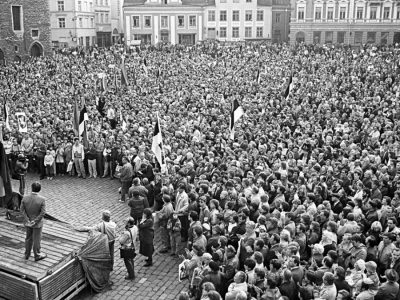On August 20th, 1968, Warsaw Pact tanks and soldiers invaded Czechoslovakia in order to put down peaceful protests inspired by Alexander Dubček’s attempts at reforming the Communist Party of Czechoslovakia. Dubček wanted to enact democratic reforms, including freedom of speech and assembly as well as economic reforms, in order to improve socialism. These reforms can be … Continue reading “Czechoslovakia Gets a Little too Western for Brezhnev”
Stalin’s Best Generals
by •
The purges of the Red Army’s officer corps in the late 1930’s were both a major reason for the USSR’s dismal performance against the Nazi invasion and a major reason for their ultimate success. At the outbreak of war in 1941, the Red Army leadership was mostly comprised of old Russian Civil War heroes unprepared … Continue reading “Stalin’s Best Generals”
Soviet Football Rivalries Got Very Serious
by •
Though the early Soviet government promoted sport and physical fitness (a healthy population was considered reflective of a healthy society), they generally considered organized competition to be against socialist ideals of cooperation. International competition especially was avoided; the Soviet government refused to take part in the ‘capitalist’ Olympics until the 1950s. Instead they held the … Continue reading “Soviet Football Rivalries Got Very Serious”
The New Economic Policy: Not Very Socialist, but Effective
by •
Due to Vladimir Lenin’s strong association with socialism/communism, early Soviet economic policy can be a bit jarring, especially the New Economic Policy of 1922. The NEP, in fact, was strangely capitalist. The NEP allowed for something of a free market, though it was still tightly controlled by the government. It allowed for investment in industry … Continue reading “The New Economic Policy: Not Very Socialist, but Effective”
Bloody Sunday: Did the Tsar Shoot Himself in the Foot?
by •
On January 22, 1905 (January 9 in the old calendar) crowds of unarmed demonstrators marched toward the Winter Palace in St. Petersburg. Mostly industrial workers and their families led by Orthodox priest Father Georgii Gapon, the demonstrators intended to bring a petition before Tsar Nicholas II. The petition called for extensive change; asking for wage … Continue reading “Bloody Sunday: Did the Tsar Shoot Himself in the Foot?”
Russia Chugs Toward Modernity
by •
Despite being a major military power, the Russian Empire lagged behind Western Europe economically for much of the 19th Century. Though many factors contributed to its poor growth, including regressive business laws and the continuing presence of serfdom, one major problem was a severe lack of transportation infrastructure. Prior to 1855, there was only one railway … Continue reading “Russia Chugs Toward Modernity”
Hello world!
by •
Welcome to WordPress. This is your first post. Edit or delete it, then start blogging!
